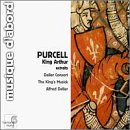| All Artists: Henry Purcell, Alfred Deller, Roderick Skeaping, Deller Consort, King's Musick Title: Purcell: King Arthur (Highights) Members Wishing: 0 Total Copies: 0 Label: Hmf Musique D'abord Original Release Date: 1/1/1978 Re-Release Date: 8/15/2000 Album Type: Import, Original recording reissued Genres: Pop, Classical Styles: Vocal Pop, Opera & Classical Vocal, Forms & Genres, Theatrical, Incidental & Program Music, Historical Periods, Baroque (c.1600-1750) Number of Discs: 1 SwapaCD Credits: 1 UPC: 794881509829 |
Search - Henry Purcell, Alfred Deller, Roderick Skeaping :: Purcell: King Arthur (Highights)
 | Henry Purcell, Alfred Deller, Roderick Skeaping Purcell: King Arthur (Highights) Genres: Pop, Classical |
Larger Image |
CD Details |
CD ReviewsThe coming out of a King Jacques COULARDEAU | OLLIERGUES France | 11/27/2007 (5 out of 5 stars) "In Shakespeare's time they had masques, important dramatic pageants based on a play but in which long intermezzi were introduced with dances, music and singing. All that forest of creativity was pulled down and felled by the puritan revolution. But when the restoration and later the Glorious Revolution took over, the theatres were reopened and musicians tried to catch up on one wasted century and to be as good at least as the continental composers. They went back to the masque but times and tastes had changed, so they expanded the genre, refusing though an all out opera, considering the English public did not want singing from beginning to end. One perfect couple of creators in that perspective was probably the poet Dryden and the composer Purcell. And the semi-opera was invented . And one of the best is "King Arthur". Purcell took advantage of the new period to play with themes that no one would have dared even to hint at some years before, the old Saxon and non-Christian England. I refuse to use the word pagan which is a normative rejection by Christians of what is not in agreement with them. He could also imagine all kinds of entertaining scenes like an orgy or some frolicking half rape half whoring scene in the hay, and imagine it being done in Shakespearian style, only with men, transvestites in all directions. And beyond love, sex and other subtle physical and physiological activities, Purcell brought English music up to par with the continent in a general catch-up movement. New instruments, new playing techniques, new voices and actors and singers. Purcell is the first great English composer of modern times who will only be surpassed by Handel some time later. But what about this "King Arthur"? Innovations are so numerous we can't cite them all. This particular recording only gives what they consider as essential scenes. But the singing is so clear, so brilliant, so luminous, the music is so purcellian the way I perceive it. Yet the cold scene does not satisfy me as much as the one I heard performed in La Chaise Dieu, a few years backn by Paul McCreesh's singers and musicians. I felt this ice then. Here I find it slightly too heavy. Ice is light and can be so beautiful on window panes in the winter. When we listen to this music we understand what the puritan revolution could have cost England if it had not come to an end in its Puritanism, even if it brought parliamentary democracy - eventually - to England, and beyond it to the whole world. It is surprising how one most troubled and even for many forgotten instead of being discussed period in history can bring tremendous improvements in the arts as well as in politics. Purcell would never have been Purcell if he had not been hungry and thirsty, along with England for some fifty years. The best of this semi-opera is the absolutely mythical past Purcell and Dryden provide England with that has no real truth in it but it satisfied the new dynasty by building a British nation or identity that had never ever existed. Nations, it is well known, are nothing but opportunistic mythical creations. But when the myth is as beautiful as this one we can really understand why it was accepted so easily and still lasts centuries later. The last remark is of course the result of the date of the recording, 1978. It is absolutely perfect - for its time. Since then singers and conductors have brought more flexibility to their music performing and their singing. So this "King Arthur" is brilliant but maybe slightly too pompous or too grandiose, too much like Louis XIV in France, not enough like the humble Queen Mary II from the Netherlands. Too much bright light. Not enough chiaroscuro. But is that criticism, since we need to know this recording to appreciate the present revival of English music from 1660 to 1700.
Dr Jacques COULARDEAU, University Paris Dauphine, University Paris 1 Pantheon Sorbonne & University Versailles Saint Quentin en Yvelines " |
